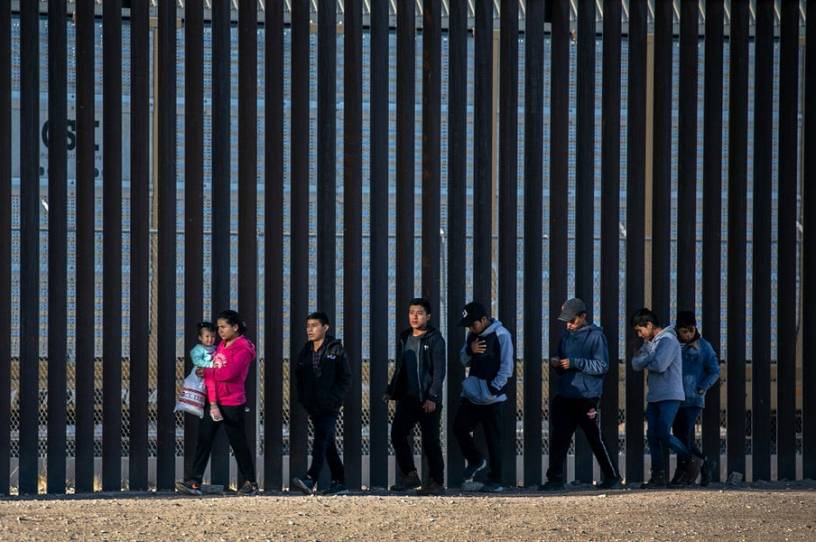As Border Challenges Persist, Let’s Not Confuse the Real Threats

Words matter. Especially when it comes to defining national security threats.
In October 2020, the Department of Homeland Security (DHS) released its inaugural Homeland Threat Assessment, a comprehensive document that identifies the major security threats facing the United States.
The assessment listed “illegal immigration” as one of seven major threats facing the U.S., placing it alongside cyber attacks by foreign adversaries, foreign and domestic terrorists, and transnational criminal organizations. By listing illegal immigration as a major threat, DHS asserted that illegal immigration has the “potential to harm life, information operations, the environment, and/or property.”
But DHS failed to provide facts to back up this assertion and instead focused on why increased migration flows, like what we see currently at the U.S. southern border, happen. The agency did not make the case that migration actually leads to harm.
The pattern of misrepresenting immigration as a threat was repeated last week by Minority Leader McCarthy when he said, “They’re now finding people from Yemen, Iran, Turkey. People on the terrorist watch list they’re catching. And they’re rushing it all at once.” Axios later reported that four people have been arrested since October 1, 2020, who were on the terrorist watchlist. In the days since the claim, neither DHS nor other members of Congress that have been briefed by DHS have provided evidence that there is a “rush” of terrorists at the border. Several news outlets have fact-checked the statement as being flawed and misleading. Of course any known or suspected terrorists attempting entry should be taken seriously, but our layered security system is designed to detect and interdict such individuals.
Exaggerated claims of terrorists at the border was a familiar refrain from the Trump White House, which declared an emergency and utilized defense funds to build the wall and justify other hardline anti-immigration actions. As explained in this 2019 DHS fact sheet, the often-cited “10 terrorists a day” attempting entry are overwhelmingly individuals traveling to the U.S. by air, not via a land border, and they are usually prevented from ever boarding the plane. The reality, as explained in DHS’s own fact sheet, is the number of watchlisted individuals that attempt entry via a land border is comparatively small. To put a finer point on it, news that there may have been four individuals encountered that were on the watchlist is not an anomaly created by the Biden administration’s decision to begin receiving asylum claims of unaccompanied minors.
Why does this matter? Calling “illegal immigration” a threat implies an undocumented immigrant poses security concerns on par with North Korea, ISIS, or the Sinaloa Cartel. This kind of false narrative is a distraction and will only get in the way of Congress passing meaningful and necessary immigration reforms this session.
What the DHS assessment and Minority Leader McCarthy are pointing to is more accurately characterized as vulnerabilities in our immigration system. Vulnerabilities certainly should be considered as part of a risk calculation, along with threats and consequences. But let me make clear: Vulnerabilities are not threats. Notably, in the same assessment, DHS acknowledged that migrants themselves pose little danger, stating that “although the majority of migrants do not pose a national security or public safety threat, pathways used by migrants to travel to the United States have been exploited by threat actors.”
National security professionals agree that border security is a critical part of keeping Americans safe. There is also bipartisan agreement that the current set of laws that make up our immigration system are outdated. This failing system creates vulnerabilities that could be exploited by individuals with criminal or terrorist intent. A border wall and more enforcement agents alone cannot resolve this.
If members of Congress are concerned about our national security, then they need to put forward a good-faith effort in negotiating bipartisan immigration reforms that advance our national interests. This legislation must resolve border security vulnerabilities, support vetting and screening of noncitizens entering the United States, expedite the hearing of asylum claims, expand legal pathways for immigration, and ensure we respect the human dignity of vulnerable migrants while upholding the rule of law.
Legislation must also address the tenuous situation of undocumented immigrants, many of whom came to America as children, have immediate family members who are U.S. citizens, and have contributed to the country for years. It should be a national security priority to know who lives within our country. Most undocumented immigrants living in the U.S. are not threats to national security and would welcome the opportunity to come forward, identify themselves, and make restitution if they were able to do so without fear of deportation.
There will no doubt be differences between the parties on the nature of the reforms necessary. It would be refreshing to hear those policy arguments made in good faith. For too long, the parties have leveraged the challenges of the present immigration system for political gain. Arguments rooted in misinformation, grievance and fear are detrimental to our national security. Lawmakers from both parties must reject polarized, all-or-nothing arguments that demonize both immigrants and their own political opponents.
Our current immigration system creates security vulnerabilities and pull factors for irregular migration. Each year that passes without immigration reforms increases our security risk. Congress needs to act. Bipartisan reforms can be done in a way that upholds the rule of law, is consistent with our national security and economic interests, treats everyone with dignity, and values immigrants’ contributions to the success of our nation.
Elizabeth Neumann served as assistant secretary of counterterrorism and threat prevention at the U.S. Department of Homeland Security from 2018 to 2020. She is a member of the Council on National Security and Immigration (CNSI) and a senior advisor at the National Immigration Forum, where she recently released a series of papers, “Insider Perspectives: National Security and Immigration.”